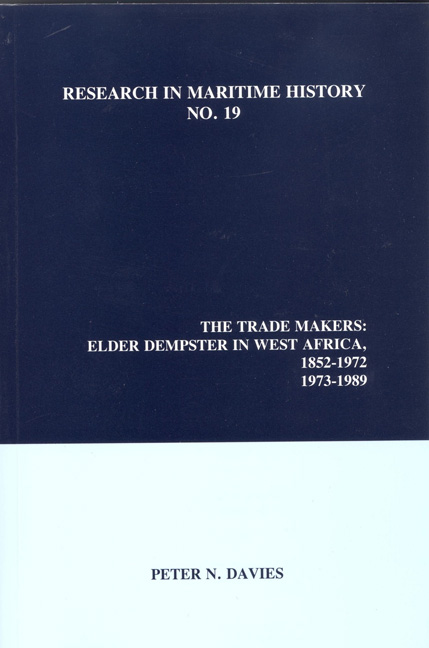Book contents
- Frontmatter
- Table of Contents
- List of Illustrations
- Foreword
- Introduction (Second Edition)
- Foreword
- Preface
- Acknowledgments
- Introduction to the Original Edition
- Frontispiece
- Part One The Pioneers
- Part Two Elder Dempster And Company
- Part Three Elder Dempster And Company Limited
- Part Four Elder Demster Lines Limited
- 11 The Reorganisation of the Company
- 12 The Second World War
- 13 Post-War Reconstruction
- 14 Recent Developments
- 15 The Future
- Part Five The End Of An Era
- List of Appendices
- Appendices
- Bibliography
- Index
15 - The Future
from Part Four - Elder Demster Lines Limited
- Frontmatter
- Table of Contents
- List of Illustrations
- Foreword
- Introduction (Second Edition)
- Foreword
- Preface
- Acknowledgments
- Introduction to the Original Edition
- Frontispiece
- Part One The Pioneers
- Part Two Elder Dempster And Company
- Part Three Elder Dempster And Company Limited
- Part Four Elder Demster Lines Limited
- 11 The Reorganisation of the Company
- 12 The Second World War
- 13 Post-War Reconstruction
- 14 Recent Developments
- 15 The Future
- Part Five The End Of An Era
- List of Appendices
- Appendices
- Bibliography
- Index
Summary
Difficulties Ahead in the Seventies
The long history of Elder Dempster and its predecessors since 1852 has shown its remarkable capacity for survival during periods of great difficulty. The years following the Second World War - like those around the beginning of the century - were extremely profitable for the Company, but by the early sixties many problems were again causing much concern. Various forms of remedial action were then adopted and gave some measure of relief, but there is little doubt that the seventies will provide a serious challenge to further progress and viability. The pattern which these strains will take is already largely apparent, for there is the likelihood of further changes in both the organisation of trade and in the West African countries themselves.
Some cargoes are now subject to regulation by the exporting state, but this has not lessened Elder Dempster's traditional preoccupation with the need to maintain friendly relations with the merchant body. The establishment of the West African Merchants Freight Association (WAMFA) in 1930 ensured that its members received adequate notice of any changes in freight rates, and that they paid no more for their carriage than other shippers. In return, each merchant undertook to remain loyal to WALCON. The Association provided a useful forum for discussion, but it is doubtful that it was able to exert very much influence on events in the thirties, as it did not include either the United Africa Company or John Holt. These two firms did join in 1950, at the same time as their shipping departments were reorganised as the Palm Line and the John Holt Shipping Line, and became members of WALCON. The dual interests of the UAC and Holt make it unlikely that their presence was a source of strength to the Association, and they may have been the main cause of its dissolution in 1959.
A new body to replace the Merchants Freight Association was formed in 1959. This was the West African Shippers Association (WASA), and as it included manufacturing interests, it seems to have been more appropriate than the former group to the changing circumstances of the trade.
- Type
- Chapter
- Information
- The Trade MakersElder Dempster in West Africa, pp. 339 - 352Publisher: Liverpool University PressPrint publication year: 2000

